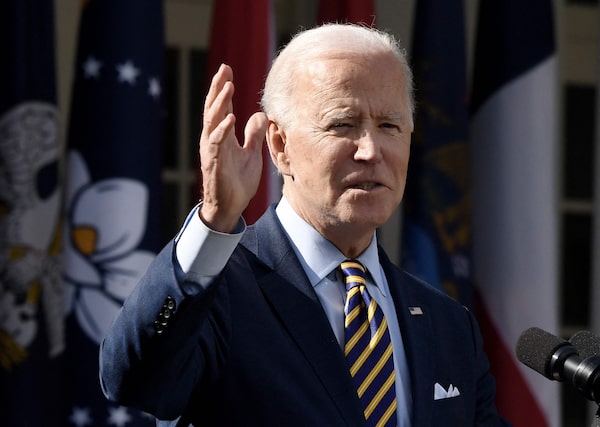
U.S. President Joe Biden gestures as he speaks during an event on the American Rescue Plan in the Rose Garden of the White House in Washington on March 12, 2021.OLIVIER DOULIERY/AFP/Getty Images
Chastened by the Republican takeover of the House of Representatives for the first time in four decades, Bill Clinton made a startling remark in his 1996 State of the Union Address when he said “the era of big government is over.”
A quarter-century later – under the leadership of a onetime moderate senator from Delaware who was in the Capitol audience when Mr. Clinton made his declaration – the era of big government is back, with a price tag of US$1.9-trillion.
Mr. Clinton’s remarks came in the fifth year of a dramatic economic expansion. And though commentators rushed to embrace the notion of the end of federal largesse, the conservative economic historian Robert Higgs, in a 1999 monograph, cited the president’s “suspect sincerity.” Big government from Washington did not wither away the way Friedrich Engels believed capitalism would decline and disappear. It merely retreated into temporary eclipse.
U.S. President Joe Biden’s massive coronavirus relief bill shows the capacity of big government to come roaring back – and it suggests that big government is here to stay, at least as long as the Democrats retain their fragile majorities in the House and Senate, both of which could vanish as soon as next year’s midterm congressional election.
“What is back is bigger than big government,” former GOP senator Judd Gregg of New Hampshire, who was chairman of the budget committee when Joe Biden was in the Senate, said in an interview. “It is gigantic government.”
Whether merely big or truly gigantic, the return to massive American government spending in the Biden bill – passed without a single Republican vote – illuminates one of the great tides in the country’s political life, with ebbs and surges as economic, social and cultural changes affect the political ecosystem.
“Government spending is largely dependent upon the demands of the electorate and upon meeting the needs of the time,” said Hans J.G. Hassell, director of the Institute of Politics at Florida State University. “Clinton spoke at a time when there wasn’t such a need for government involvement – that’s not the situation now.”
A century ago, Calvin Coolidge advocated budget cuts in peacetime and believed the only time Americans need encounter the federal government was when they entered the post office – and he cut the budget for that, too, even though his family operated a tiny post office in a remote corner of Vermont. Four years after Coolidge left office, Franklin Delano Roosevelt undertook the largest expansion of government in the country’s history, his New Deal sending Washington tentacles into the farthest reaches of American geography, the American economy and the most quotidian aspects of American life.
The lawmaker who holds the budget committee gavel that Mr. Gregg swung with purpose in his efforts to pare back Washington spending a decade and a half ago is another New Englander with a completely different outlook. It is Senator Bernie Sanders of Vermont, the two-time presidential candidate who identifies as a democratic socialist and who advocates higher taxes on the rich and described the COVID-19 relief bill in a CNN interview as “the most significant legislation for working people that has been passed in decades.”
It is telling how closely the Sanders analysis aligns with the characterization of White House press secretary Jen Psaki, who described the measure as “one of the most consequential and most progressive pieces of legislation in American history.”
That is a measure of how the American mood has changed during its retreat into virus isolation.
Indeed, the latest NPR/PBS News Hour poll conducted by the respected Marist Institute shows an astonishing transformation in public attitudes toward spending. Over all, 58 per cent of Americans approve of the relief bill, with 21 per cent believing that it did not go far enough. Only about a third of the public believes it went too far.
“Big spending is back, and concern about the deficits is almost non-existent today among elected officials, including my fellow Republicans,’' said former senator Robert Kasten of Wisconsin, who served on the budget committee in the Ronald Reagan years. “No one is talking any more about how much debt we are leaving our grandchildren. We all used to give that speech.”
In fact, in his 1981 inaugural address, Mr. Reagan said: “Government is not the solution to our problem – government is the problem.”
That view clearly is antiquated in an era when Washington, under former president Donald Trump, undertook a fast-track process to develop vaccines, and, under Mr. Biden, is distributing them at a rate of about two million a day. In any case, GOP Senate leader Mitch McConnell of Kentucky is arguing that an economic boom that “will have absolutely nothing to do with this $1.9-trillion” is coming. Even so, big government is back.
Our Morning Update and Evening Update newsletters are written by Globe editors, giving you a concise summary of the day’s most important headlines. Sign up today.
 David Shribman
David Shribman